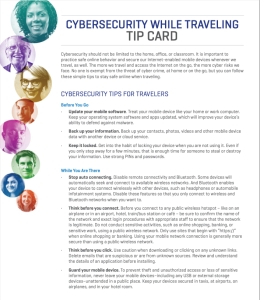Cybersecurity Tips To Follow When You Travel
When traveling–whether for business, vacation or a little of both–you are particularly vulnerable to cybersecurity risks. Although technology-related dangers are always present, threats are especially elevated whenever working away from home or the office. Cybersecurity experts, government agencies and technology professionals agree you should adopt several corresponding habits when traveling to better protect yourself, your devices and your data. So be sure to consider these practices the next time you hit the road.
Update Your Software
One of the easiest weaknesses for hackers to exploit is known issues. Software providers and hardware manufacturers regularly publish fixes. They routinely release new software and operating system updates and hardware patches to address widely publicized errors that leave systems vulnerable to easy attack. Yet, many organizations and users don’t promptly download and install these updates. The subsequent unpatched apps and hardware prove easy pickings for hackers working diligently to compromise and infect networks and devices. Protect yourself when traveling by downloading and installing operating system, program and firmware updates before leaving. Even better, make the practice a common habit.
Back-Up Your Data
Before leaving on a trip, back up any locally stored data on the devices that will accompany you. Backing up all the important files, images and other information from your smartphone, tablet and/or laptop will help ensure you can recover the data should a device become lost, stolen or compromised while traveling. Ensure important files are safely stored in a cloud account, backed up using a local drive, copied to a thumb drive or protected using another strategy. While industry observers don’t always agree on everything, experts unanimously advocate backing up your devices before hitting the road.

Lock Your Devices
One way to make it harder for criminals to access your data is to lock your devices. Employ complex passcodes, Face ID and similar features on all your devices when you travel, and set laptops to automatically lock after short periods of inactivity. Should your smartphone, tablet or laptop be lost or stolen, malicious users will then have to work much harder to gain access to your identity, any connected networks and your information. Further, Android users can enable Google device protections, while iPhone users can take advantage of Apple’s new Stolen Device Protection feature to further assist locking smartphones to better prevent unauthorized access. As yet another best practice, you should also encrypt laptops and any external hard drives to make the data they hold inaccessible to others not possessing the corresponding decryption key.
Guard Your Devices
You may have read it’s safe to leave your smartphone on a table to reserve your spot when traveling in Asia. But that doesn’t mean you should. Numerous experts concur; it’s best to physically guard your electronic equipment when traveling. Avoid even revealing you possess devices whenever possible. The less people know what you’re carrying the better. When you do use a smartphone, table or laptop in public, guard these tools. Never leave them or the luggage in which they’re stored unattended or out of your site.
Don’t automatically connect to resources
Smartphones, tablets and laptops typically include Bluetooth and WiFi features permitting them to automatically connect to available networks and other resources. Disable these features when traveling to prevent automatically connecting to compromised networks, malicious devices and other dubious resources. When on the road, it’s best to distrust networks and resources unless you’re sure of their provenance and can confirm the resources are properly configured and secured, such as might occur within a corporate branch office or HQ location. Free airport, hotel, coffee shop and other public WiFi networks are best avoided.
Skip Using Public Computers
While using a public computer may prove convenient, avoid using such resources. Hotels, visitor centers and trade shows often make public computers available to guests to assist confirming or changing travel plans and printing email messages, airline tickets and similar information. But printing a boarding ticket, changing reservations or mapping a route usually requires you to enter personal credentials. Because these systems are notoriously subject to hacking and compromise, resist using public computers and never enter personal information on such a system.
Avoid Public Charging Stations
Even if your smartphone battery is on 10 percent and you need to use your phone for urgent needs, do not connect to public USB charging stations. Use or buy your own charger, instead. Public charging stations and even charging blocks of unknown provenance can include malicious software that collects your personal information, including credentials needed to log on to sensitive systems. Known as “juice jacking,” the cyber-theft practice has led to devices becoming infected, so avoid using public USB charging stations often found in airports, hotels and even grocery stores.
Beware of location Services
Location services come in handy and prove helpful when trying to locate the closest bodega, hotel, restaurant or coffee shop, among other places, when traveling. But they also give your location away, including when publishing photos and posting messages to social media. Multiple authorities recommend considering the risks location services surface and acting accordingly, such as by avoiding social media posts that reveal you’re traveling and are away from the office and/or home. This is true for photos, as well, which can inadvertently reveal your specific location to others.
Set Up Tracking
Enabling Find My features, storing Apple AirTags with various electronics and using similar tracking services assist recovering lost or misplaced devices. In many cases, even stolen electronics can be recovered using these features specifically designed to track devices. Many tracking features, including Apple’s and Google’s Find My device services, also permit remotely wiping and disabling lost or stolen equipment. Just be sure to enable and confirm these tracking capabilities are working properly before you leave on a business trip or vacation.
Remove Sensitive Data
Before traveling, remove all unnecessary sensitive data and information from the devices making the trip with you. The FCC is among the authorities recommending you take this step, especially before going overseas. The less proprietary, identity-related and financial information present on a device, the less damage can be done should that device become compromised, lost or stolen. Consciously limiting the files and information on a device reduces exposure when traveling.
Protect Your Screen
One of the most effective methods of stealing login credentials, passwords and other sensitive information is decidedly low-tech: simply observe what a victim enters or views onscreen. Whether witnessing a login, passcode entry or other information, an experienced hacker can steal compromising information simply by observing you using your smartphone, tablet or laptop. Malicious actors don’t even need to be located nearby; they can steal passwords and logins from a distance when you won’t even know you’re being observed. Subsequently, protect your screen and ensure a hacker, potentially one using a pair of binoculars in a building next door, can’t see your screen and the information you’re entering.
Change all passwords upon returning from overseas travel
After traveling internationally, in particular, many experts recommend changing all the passwords you used while you were away. Because wireless infrastructure, wired networks and even cellular network services can be compromised by malicious actors, a best practice is to change all the passwords you entered while connected to any such sources, just to be safe. Updating credential sets helps ensure any leaked logins or passwords no longer work, thereby making it more difficult for hackers to access accounts, penetrate networks, establish persistence or monitor your online activities.
Employ Security Cameras
Those travelers who are particularly security conscious can place wireless security cameras in their hotel rooms and vacation rental properties to monitor what happens within those spaces whenever they are not present. A Computerworld columnist just last month noted the practice is one he adopts when traveling to assist safety and privacy when traveling. Should someone enter these areas while you’re gone, you can at least know what they did and have a record of those activities. While the practice might sound extreme, hotels, resorts and vacation rental properties are already a significant concern to many security experts. Monitoring what happens in your room or rental can prove invaluable, should trouble arise, and potentially prevent dangerous situations.
Use antivirus
Another common recommendation included on most every observer’s checklist for best cybersecurity tips to follow when traveling is the admonition you use an effective antivirus application. As hackers have begun incorporating artificial intelligence (AI) and machine learning (ML) technologies within their efforts to compromise, penetrate and corrupt victim’s systems and networks, so too have cybersecurity software providers implemented these same tools within their antimalware solutions. Before traveling, ensure your devices are using an effective antivirus solution, preferably one designed to assist combating ransomware, and that the software is updated and working properly before you hit the road.
Enjoy Your Trip!
Certainly, reviewing what can go wrong when traveling can prove disconcerting. But being prepared helps navigate problems when they do arise and helps minimize the odds things will go wrong. Regardless, digital worries aren’t your only concern when traveling. Bad weather, canceled flights and missed connections are among other issues threatening trips. Adopting the cybersecurity guidance industry observers and government authorities recommend helps you at least minimize the risks from some of the factors you control so that you can prove more effective on business trips and better enjoy yourself while vacationing.



